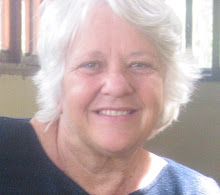In my job as hospital chaplain I see many gentle and beautiful people who are dying in part because of the burden their extra pounds put on their hearts, their backs, their knees and the whole system. I see the suffering of family members - spouses and partners, parents, children.
I think about the extra pounds that I carry on my small frame - the bones are still strong but I'm getting older. I should lose at least ten pounds - twenty would be better. Recently I've learned that my self-image has changed over the years so that now I see my self as a plump woman with a prominent tummy - cringe, cringe. So I'm working on reconnecting with another image of myself, trying to know in my bones and in my belly that I, Greta, will be myself if I return to the image of my twenties and thirties. I've looked at photos where my waist is slender and then I check some favorite dresses that I was never able to discard and see that same slender waistline.
Would I welcome my doctor's words about my extra pounds if she decided to raise the issue? I think now I would. Maybe in the past I could have heard her if she stuck to the health consequences of extra weight. Would words from her motivate me? I don't know. But I can think of two motivations that would make sense to me: lower insurance premiums for an improved BMI, and a safe place to post my success for others to see. The costs to individuals, families, communities, the work force, and the health system are huge, and it is in everyone's interest to overcome the obesity epidemic. I don't believe in shaming, but I do think that a stronger public approval for appropriate weight would be a good thing, while maintaining tolerance and compassion for those who are unable to reach the norm.
In any case, I applaud the doctor in the article and hope that he will find successful approaches as he talks to his patients.
